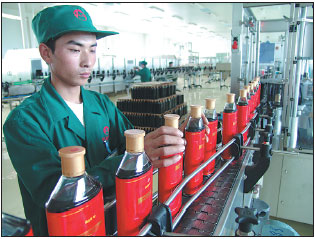Wolfberries' history, culture still growing
To citizens in the county of Zhongning, the wolfberry is more than just a small red fruit.
On the wall of a 68-year-old farmer's house in the county in Zhongwei, a city in Northwest China's Ningxia Hui autonomous region, hangs a black and white picture of an old man grasping the stem of a wolfberry plant with pruning shears in his hands, with the bold line "The God of Wolfberries, the Soul of Farmers" written below.
The man in the picture is known as Zhang Zuohan, who first discovered the socalled "damaye wolfberry" with deep green leaves on a 1.5-meter-high tree, in 1938.
"The discovery laid the foundation for the invention of 10 new varieties of Zhongning wolfberries with better disease and insect resistance," said Zhang Zuohan's 68-yearold son, Zhang Weizhong.

According to the son, he is the third generation in his family to plant and study wolfberries, followed by the fourth generation - his five children, who all took up business related to wolfberries. Now his family has a plot of wolfberry land with an area of about 0.33 hectares, which generates 40,000 yuan ($5,919) to 50,000 yuan in sales of wolfberry products each year.
"I have planted wolfberry for more than 40 years," said Zhang. "Now I sell the familymade dried wolfberry, wolfberry cream and wolfberry wine through my third son's stores."
Zhang said his farmland was also used to do experiments with new varieties of wolfberry for the local government.
"Some of the new varieties were found unsuitable to plant, so we dug them out and tried some new," Zhang said.
He also mentioned he quit his post as the Party chief of Shangqiao village in 1990 to focus on his family business. "My father studied wolfberry for his whole life, and I aimed to follow his career," he said.
Hu Zhongqing, an expert on agricultural promotion authorized by the Ministry of Agriculture and the previous director of the Zhongning Wolfberry Industrial Development and Service Bureau, is also determined to study the wolfberry.
According to Hu, local residents in the past had to wait four years for wolfberry crops to bear fruit.
After research, by developing and breeding new varieties, crops can bear fruit within their first year and flourish most in the fourth year.
"I grew up in gardens of wolfberries, and I saw myself as the son of farmers," he said. "I studied gardening at the university. I think I will let my hometown down if I can't help improve the quality and production of wolfberry now that I have the knowledge."
After retirement, Hu continued his study of the production of organic wolfberry that doesn't use synthetic chemical fertilizer or pesticides.
Wang Hairong, chairman of the Zhongning Federation of Literature and Art, said people there have been indulgent in this small red fruit.
"Wolfberry has a planting history of more than 1,300 years in our county. From generation to generation, villagers have planted, sold and studied this kind of fruit. And some of them have a religious-like obsession with the problem of how to produce higher-quality wolfberries," said Wang. "They admire the wolfberry because it has profoundly changed their life."
According to Wang, a variety of activities have been held in the county to promote the culture of the wolfberry. Books, cartoons, songs and documentaries were created. Calligraphy contests, wolfberry cultural festivals and pick-up festivals were organized. Museums and experience pavilions were opened.
"The activities are expected to help citizens learn about their history and what makes them who they are," said Wang.
They also aim to boost the development of the industry, he said.
"We expect to make wolfberry a trademark of the county by forging a distinctive kind of culture and infusing cultural elements into every link of production," Wang said.
"Wolfberry represents the roots and soul of Zhongning people, and the connection comes from what the fruit has brought to humanity throughout the long stretches of history."
Chen Meiling contributed to the story.
|
An assembly line worker bottles wine, a wolfberry product. Zhongning, a county in the Ningxia Hui autonomous region, has a full lineup of products. |
(China Daily 11/04/2016 page10)















